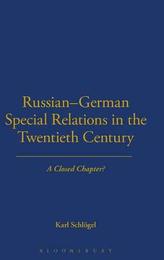
|
Russian-German Special Relations in the Twentieth Century: A Closed Chapter
Hardback
Main Details
| Title |
Russian-German Special Relations in the Twentieth Century: A Closed Chapter
|
| Authors and Contributors |
Edited by Karl Schlogel
|
| Series | German Historical Perspectives |
|---|
| Physical Properties |
| Format:Hardback | | Pages:288 | | Dimensions(mm): Height 234,Width 156 |
|
| ISBN/Barcode |
9781845201777
|
| Classifications | Dewey:327.4304709 |
|---|
| Audience | | Tertiary Education (US: College) | |
|---|
| Illustrations |
bibliography, index
|
|
Publishing Details |
| Publisher |
Bloomsbury Publishing PLC
|
| Imprint |
Berg Publishers
|
| Publication Date |
1 August 2006 |
| Publication Country |
United Kingdom
|
Description
Twentieth-century Europe, especially Central Eastern Europe, has been largely defined by Russia and Germany. In this century, cultural and economic exchanges between the two countries were as active as the fires of hatred intense. The smaller states in between, with their unstable borders and internal minorities, suffered from the powers' alliances and their antagonisms. This volume of new research in political and cultural history examines the two powers' turbulent relationship, including the pre-1914 era of exchange and cooperation; the projects of modernity in post-revolutionary Russia and Weimar Germany; the struggle for dominance over Central Europe in World War II; and mutual views of Germans and Russians after 1945. In the wake of the crucial events of 1989 and the transformation of German-Russian relations, it asks whether the configuration of Russian-German relations that once dominated twentieth-century Europe has now dissolved, leaving us to find new ways of cooperation between 'New Russia' and 'New Europe'.
Author Biography
Karl Schloeegel is Professor and Chair of East European History at Europa University Viadrina in Frankfurt (Oder).
Reviews'The well-researched and well-written papers present a perspective on German-Russian relations from the early twentieth century until the present with a view into the later twenty-first century.' German Studies Review 31/1 (2008)
|